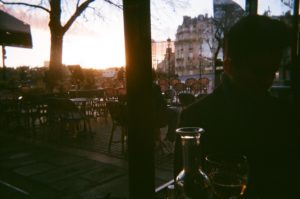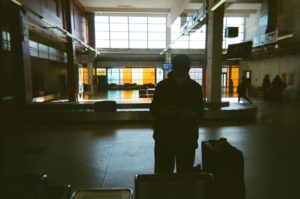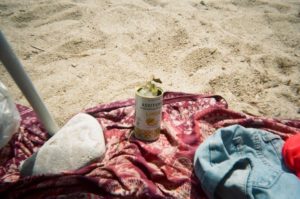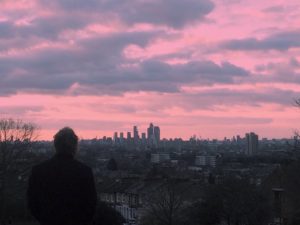Every year, we give over all of December (and usually most of January) to a series called ‘Shadows and Reflections’, in which our contributors share highs, lows and oddments from the past 12 months. Today it’s the turn of Jessica Andrews.
Scene 1
It is New Year’s Eve. A dank, sweaty basement crammed with bodies. Strobe lights, techno and the sound of balloon canisters. People step cautiously around each other, caught between joy and fear.
GIRL: We dance, hard and electric. We haven’t been this close to other bodies for years now and we are afraid and defiant. I have been feeling desperate, as if the light as been sucked out of everything, life shrunk small and rigid. We stay up all night, moving from basement to house party to club, spinning beneath pink strip lights. We walk home in the dawn of another year, bright-eyed and elated, until we become ill with the virus a few days later, as punishment, I think.
INTERVIEWER: The protagonist of your novel never allows herself to have good things. Why do you think that is?
Scene 2
A city street strewn with leaves and rubbish. Wheelie bins blow into the middle of the road. A tree falls and brings down the powerlines. People are warned to stay at home.
GIRL: It is the night before my 30th birthday. The biggest storm in 30 years pulls trees across train tracks and destroys electricity cables. The old man next door has his roof blown off and his house begins to flood. A fireman turns up with his arms full of flowers. My friends come and dance, despite everything, and my mother sends me a card which says, thirty whole years of you.
STUDENT: The main character in your novel is kind of juvenile, isn’t she? I would call her juvenile, I think.
Scene 3
A hospital ward. Everyone is wearing surgical face masks. It smells of plastic and antiseptic. GIRL sits next to NAN, who is wearing an oxygen mask in bed. NAN is eating Oreos and dark ridges of crumbs are caught beneath her fingernails.
GIRL: When I got the call to say my nan was dying, I was on my way to the train station, after spending two days in a theatre, working on a stage adaptation of my first novel. There were actors saying lines of dialogue I had taken directly from members of my family. We spent days talking about the relationships between the characters and I began to lose track of which aspects of their lives were real and which I had invented. My phone was losing battery and I went into a pub to charge it. I stood at the bar with trembling hands, trying to work out what to do. The scene felt overly-dramatic and I wanted to re-write it. Would the girl really stand at the bar, shaking like that? Is it believable that she would charge her phone through a USB slot in the Guinness pump? Is there a more subtle way to convey these feelings?
DIRECTOR: What exactly is it that she wants from her family? Does she want to take them with her, or does she want to leave them behind?
Scene 4
A busy street on the outskirts of Paris. The daylight is fading and café lights begin to glow. GIRL and BOY sit at a small, round table, facing the traffic. It is cold and the air is thick with petrol. They eat sardines on toast and drink red wine.
GIRL: I am taking tentative steps into the world again. I remember how I felt at 22, when I lived in this city and the world felt impenetrable, largely because I refused to take the world inside of myself (or perhaps the world refused to take me inside of it), although that was the way I learned to cope. We go to a restaurant I used to cycle past every day, admiring the people sitting outside of it, feeling lonely and small. Now we step inside and stand at the brass bar eating cheese, bread and olives. The barman tops up our glasses straight from the bottle. I catch my reflection in the mirror on the wall and look straight back at myself without flinching.
GOODREADS REVIEWER: This novel is about a young female born in England with a father who is never around. She has issues with how she looks. I found this to be depressing as she is constantly obsessed.

Scene 5
A bright, cold beach in Whitley Bay. GIRL and MOTHER follow the edge of the water. They both look pale and tired.
GIRL: The day after my nan’s funeral, my mother tells me that my father is very unwell. The doctors think he has a disease which is caused by exposure to chemicals. He is an electrician who has worked in factories filled with chemicals for his whole life. The sky feels too white and bright and I close my eyes behind my sunglasses. I have always wanted to protect my dad but I have never been able to.
INTERVIEWER: But now you’re a novelist and a university lecturer. Do you still consider yourself to be working-class?
Scene 6
A baggage carousel at Marseille airport. GIRL and BOY wait for their suitcases. Sunlight falls through coloured glass, casting everything in yellow and green.
GIRL: I am feeling dramatic, as if I need to upend everything, to burn everything I have built and begin again. But in Marseille, the world begins to feel possible in a different way. We swim in the freezing sea and get drunk on tiny glasses of dark wine, smoking cigarettes on the street. I eat prawns in garlic and feel the sun on my bare skin for what feels like the first time in many years. Colour seeps back into my vision and I feel calmer, less desperate, as though a trapped thing inside of me is breaking free.
EDITOR: The events that you are writing about happened ten years ago. What about now? Can you tell us what your adult life looks like today?

Scene 7
A dive bar in Manchester. It is late and GIRL sits at the bar with FRIEND, drinking fizzy wine. FRIEND takes out her copy of GIRL’s new novel and passes it around the bar.
FRIEND: She wrote this book.
STRANGER: Who did?
FRIEND: She did!
STRANGER: (to girl) Did you really?
GIRL: Writing my second novel was hard for many different reasons. I was trying to articulate something that was difficult to say. The world went into lockdown and I spent months writing in a beach town outside of Barcelona, unable to leave the house. I spent a year in a new city, writing every day and feeling as if I would never reach the end. Frightening things kept happening to people around me. But now I have reached the end and the book is beginning a life outside of me. It felt impossible for a long time but I did it anyway.
AUDIENCE MEMBER 1: Isn’t it embarrassing to write about your life? How do you get over that?
AUDIENCE MEMBER 2: I’m disappointed that this discussion has been all about women today.

Scene 8
A beach on the Costa Brava at night. GIRL and BOY sit in the sand, sharing a glass of whiskey, brought from a chiringuito. They take off their clothes and run naked into the black water.
GIRL: I have learned to run headfirst into joy, whenever it appears. I am with someone I love and the water is cold and there are sand and pebbles beneath my feet. My lips taste of salt and stars puncture the sky.
BOY: I feel like we’re living in your book.
GIRL: Don’t say that. I want to live in the world instead.
Scene 9
A small room in a London houseshare. GIRL sticks postcards to the wall above a desk, being careful not to chip the paint. She opens the window and looks down at the yellow trees on the street.
GIRL: I have come back to London to start a new job. The city holds ghosts for me and I want to forget them, but I look around my room and at my small pile of books and feel that I have gone back in time, as though I will be 23 forever, unable to move forward. The months roll on and I read, write and teach. I meet friends for half-pints of beer and midnight dumplings and I walk the familiar streets in the cold. I sit on trains in the dark and have long conversations at kitchen tables until I begin to feel like myself again, broken out of a rut.
REVIEWER: This book made me feel glad that I will never again be in my early twenties in London.

Scene 10
A hospital car park. A huge Christmas tree prickles with coloured lights. It is bitterly cold and GIRL meets BOY at the entrance to the hospital and holds him tightly.
GIRL: The year ends in loss. The days are riven with sadness and we move through them gently, treating each other with care. A lot has been lost over the past months, but a lot has been gained, too. Life has begun again, after years of stasis. There is colour and joy as well as hurt and there are people around me to share in these things, families that I have chosen. Things are shifting and changing, as they always will be, but suddenly, there is an adult life, and here I am inside it.
READER: This book made me feel hungry for the world.